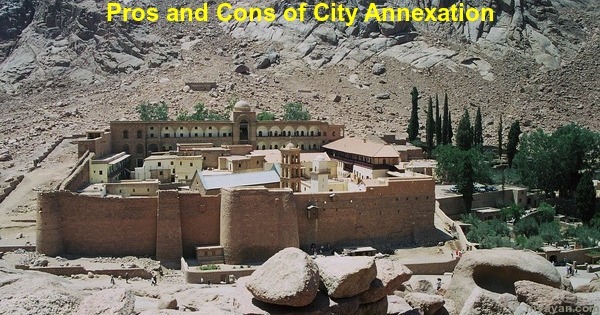City annexation is the process of a municipality expanding its boundaries by incorporating surrounding unincorporated areas. City annexation can be a controversial issue with proponents and opponents of such measures, often due to conflicting interests between communities. As a responsible individual making a decision, it is important to consider the pros and cons of city annexation.
From a civil authority’s viewpoint, there are many pros of city annexation. These include:
One of the most obvious advantages of city annexation is that it increases the tax revenues for the municipality. This allows local governments to improve and expand existing services or even add new ones if needed. The services in turn benefit the local residents in different ways.
Annexing an unincorporated area into a city can help improve the quality of life for those living in the annexed areas. This could be accomplished by providing better public services and amenities, such as police protection, schools, parks, libraries, and reliable garbage collection.
City annexation can also be beneficial for economic growth. Businesses may be enticed to move into the area due to lower taxes and improved infrastructure, which can help create jobs and spur further development in the area.
Incorporating an unincorporated area into a city can help make long-term planning easier. Local planners are better able to consider the needs of the entire municipality, allowing for more efficient and comprehensive decisions.
Annexing an area into a city also gives those living in the annexed areas greater political representation. Citizens of the annexed area now have access to voting rights and can be more easily heard by local government officials.
Despite the counts of benefits to local people, opponents often debate over some significant cons of city annexation. These include:
The city needs to increase its population to qualify for certain resources and programs; it often means expanding its boundaries and increasing the tax burden on new and existing citizens. Annexation may bring additional regulatory costs that could add up quickly.
Other hidden costs associated with the annexation process may become apparent, such as legal fees or rezoning costs. All these factors can make city annexation costly for both the local government and citizens.
City annexation is often met with opposition from residents of both the municipality and the annexed area due to fears of taxation, disruption of existing community ties, or a lack of representation in local government.
Annexing an area into a city may result in a loss of autonomy for those living in the annexed areas, as they are now subject to the laws and regulations of their new local government.
There can also be conflicts of interest between communities when an area is annexed into a city, as different communities may have different goals or objectives that could clash with one another.
City annexation can also lead to the loss of property rights for those living in the annexed areas, as local governments may take away certain rights or restrict land use.
City annexation is a complex process where diverse views can be expressed. While there are some benefits of city annexation, such as increased economic opportunities and access to public services, there are concerns about controlling development and preserving the integrity of rural communities.
Ultimately, it is up to local governments, businesses, and citizens to assess the pros and cons of their own situations and conclude. By understanding the complexity of city annexation, citizens can make informed decisions that have long-term ramifications for their community’s future.
Therefore, local officials must consider this issue's depth and breadth when deciding how best to move forward with their project. With proper research and careful consideration of all involved parties, the city can create a structure that meets everyone’s needs responsibly. Now it is time for you to assess the pros and cons of city annexation, draw conclusions, and then decide best.

Annexation defies simple categorization as good or bad, as its perception hinges on individual perspectives. Homeowners may deem it unfavorable, burdened by higher property taxes, while municipalities may perceive it favorably, benefiting from increased revenues and an expanded tax base.
An annexed city is created by constructing the Annex City building, which allows for the mobilization of units within the city. Annexation of a city will result in a significant boost to its production rate, increasing it from 25% to 50%.
Annexation represents an act of aggression that is strictly prohibited by international law. According to the principles of International Humanitarian Law (IHL), if an Occupying Power decides to annex all or a portion of an occupied territory, ensuring that the individuals protected under the Fourth Geneva Convention continue to enjoy the rights and privileges bestowed upon them is imperative.
Annexation is a formal declaration by a state asserting its sovereignty over previously unclaimed territory. Unlike cession, which involves transferring territory through treaty, annexation is a unilateral action enforced by taking physical control and acknowledged by the international community.